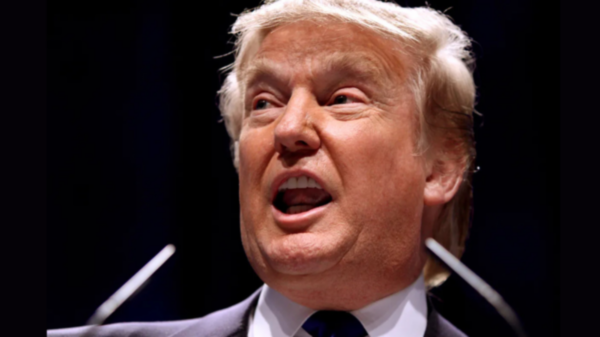By Zachary B. Wolf

Americans may feel like they’re reliving 2020, with a general election rematch set for 2024. But while the politicians’ faces are the same, life is much different.
On March 13, 2020, then-President Donald Trump declared a national emergency for the Covid-19 pandemic.
No one knew at the time exactly how much life was about to change. Reading CNN’s coverage from that era, however, is like transporting oneself back to the time that so many people have either forgotten or want to block out. We had no idea what was coming.
But it’s equally remarkable, precisely four years later, how Covid-19 has both changed American life and also faded to the background.
Lockdowns, face masks and the question of whether kids should be in the classroom were daily, top-of-mind issues that had very real impacts on how people voted in 2020. The special measures states took to ensure that more people could vote during the pandemic formed the basis of the conspiracy theories by which Trump today refuses to believe he lost back then.
The Covid-19 stats are still unbelievable
Nearly 1.2 million people in the US have died from Covid-19 during the past four years, according to the US Centers for Disease Control and Prevention. While mass outbreaks and hospitalizations appear to be over, there were still at least 500 people who died of Covid-19 per week as of the week ending March 2. In January of this year, more than 2,000 Americans died of Covid-19 each week.
The US government acknowledges spending about $4.4 trillion to address Covid-19, a shocking figure in hindsight that spiked the national debt.
That doesn’t count the trillions in extraordinary measures undertaken by the Federal Reserve, which added more than $4 trillion to its balance sheet during the pandemic.
People can debate what role the federal spending had on inflation, but it also helped stabilize the country at a time of unprecedented uncertainty when the US economy essentially shut down. It’s remarkable to consider that in exit polls for the 2020 presidential election, 44% of voters said the pandemic caused them no financial hardship at all.
The economy is still adapting
Inflation that spiked after people emerged from lockdown has begun to ease, but Americans still have trouble making ends meet despite better wages.
Higher interest rates make homebuying seem out of reach to many. Empty office buildings and the uncertain state of commercial real estate means the aftereffects of the pandemic are not yet entirely known.
Other countries have a lot more adapting left to do. Read about how many Covid-19 precautions are just being lifted in China, which maintained a draconian zero-Covid policy that locked out the world for years.
Jogging memories
President Joe Biden felt the need to jog people’s memories during his State of the Union address that the pandemic first struck when Trump was president.
“Remember the fear. Record job losses. Remember the spike in crime. And the murder rate,” Biden said last week, trying to flip the script on complaints about public safety in recent years. He added, “The pandemic no longer controls our lives. The vaccines that saved us from Covid are now being used to help beat cancer. Turning setback into comeback.”
Trump, offering live commentary on the speech on his social media platform, wanted credit for Covid-19 vaccines.
“YOU’RE WELCOME, JOE,” he wrote, adding that vaccines were developed quickly while he was in office – although presumably any president would have done everything possible to aid the development of vaccines.
The more interesting development from that post was the instant backlash Trump got from some of his normal allies who are vaccine skeptics. One constant in Trump’s 2024 stump speeches is his pledge to strip public money from any school district that imposes a vaccine requirement on students. His campaign argues he only means the Covid-19 vaccine, but vaccine skepticism is growing in the US, as are outbreaks of preventable diseases like measles.
One new voice gaining attention in presidential politics is Robert F. Kennedy Jr., the vaccine skeptic who rivals Trump in his embrace of conspiracy theories and is trading on his famous name to run as an independent candidate. Kennedy draws 15% of the vote in some polls. Kennedy and the super PAC that supports him are targeting swing states as they gather signatures to appear on the presidential ballot.
Fewer Americans are up to date on vaccines
A recent Pew Research Center survey shows a decline in concern among Americans. According to CDC data, less than 23% of US adults reported getting the most recent, recommended dose of the Covid-19 vaccine.
Only a little more than a quarter of adults (28%) said they were up to date on the latest Covid-19 vaccine.
There is an expected partisan divide in those figures: 42% of Democrats and Democratic-leaning independents are up to date compared with 15% of Republicans and GOP leaners.
On the other hand, the partisan gap in concern about the coronavirus has shrunk. Most people in both parties do not see Covid-19 as a major public health threat. The official US public health emergency ended in the US in May 2023.
Now part of life
The physical threat of the disease has diminished, which led the CDC to recently drop recommendations that people who contract it isolate for multiple days. Now the government suggestions are in line with those of other respiratory infections. People who get Covid-19 should stay home only until they have been fever-free without medication for at least 24 hours and had improving symptoms for 24 hours.
In changing the guidelines, CDC Director Dr. Mandy Cohen said most of the US population has some immunity against Covid and that large waves of infections have given way to smaller and more predictable bumps in the summer and winter. Read more from CNN’s Brenda Goodman.
Long Covid affects millions of Americans
Covid is still a challenging disease for many. In addition to the predictable seasonal bumps, studies suggest large numbers of Americans are dealing with long Covid.
More than 9% of women who contracted Covid during pregnancy reported having symptoms six months or more after they were infected, according to one study. Pregnant women might actually get long Covid at lower rates than the general population.
Another study looked at the effect on children, up to 6 million of whom have developed long Covid. Children may not get over the physical symptoms of long Covid for more than a year, but there may be compounding effects if they miss out on a year or more of experience while they recuperate. A survey from late last year found that nearly 1 million US children and nearly 18 million US adults reported symptoms of long Covid. Read more from CNN’s Jen Christensen.
About the kids …
Every child who was alive during the Covid era will have been affected by that formative experience.
A New York Times review of testing data earlier this year suggested there was a rebound in 2023 from Covid learning loss, the well-documented drop in test scores after so many students spent so long away from the physical classroom.
But the rebound is far from complete, and it is more pronounced in richer school districts – evidence for the obvious takeaway that the pandemic will have driven financial inequality particularly for children.
One controversial move Democrats made when they doubled down on Covid relief without Republicans in the early days of the Biden administration was to create a temporary, new benefit that put money in the pockets of low-income parents by expanding the child tax credit and making it “refundable.” The payments temporarily raised millions of American kids out of poverty.
But inflation spiked and public sentiment turned on public safety net expansions, and the tax credit expansion expired. Democrats could not marshal the votes to extend it. Biden made the pitch to bring the expanded tax credit back (paid for by raising taxes on the wealthy) in his State of the Union address. The House recently passed a bill to expand the credit – along with sweeteners for businesses – but it’s not clear if the Senate will act.
Where did the virus come from? We still don’t completely know
We still do not know exactly how the coronavirus developed. There is a remarkable amount of circumstantial evidence that points to some kind of lab leak in Wuhan, China.
But serious questions remain about when and how researchers in China first discovered the existence of the coronavirus. The lack of transparency by the Chinese government has fed the so-called lab leak theory.
The scientific mystery remains. And the national security mystery remains too. In June, CNN reported the US Intelligence committee is still split over whether the virus developed in a lab or in the wild, and no one trusts China to share all of the information.
That kind of mistrust is a problem, according to Tedros Adhanom Ghebreyesus, director general of the World Health Organization. He told CNN’s Becky Anderson in February in Dubai that the world is not ready for “Disease X,” the unknown pathogen that could bring the next pandemic.
“We’re not prepared because still many of the problems we have seen during the pandemic are still there,” he said, calling on countries to do more to share information and technology.







You must be logged in to post a comment Login